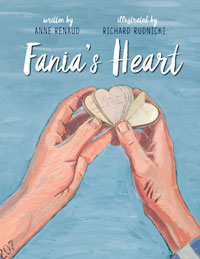| ________________
CM . . .
. Volume XXIV Number 19. . . .January 19, 2018

 |
Faniaís Heart.
Anne Renaud. Illustrated by Richard Rudnicki.
Toronto, ON: Second Story Press, March, 2018.
32 pp., hardcover, $18.95.
ISBN 978-1-77260-057-5.
Grades 1-6 / Ages 6-11.
Review by Harriet Zaidman.
**** /4
Reviewed from Advance Reading Copy.
|
| |
|

excerpt:
When I was almost ten, I came upon another of my motherís secrets. I would have missed it, had it not tumbled from a lace handkerchief I found in her dresser. I sometimes forgot I was not supposed to rummage through my motherís bedroom.
Faniaís Heart is the story of one woman, but it represents the story of everyone who has survived ghastly crimes against humanity, such as The Holocaust by the Nazis in World War II. Faniaís Heart is a simply told nonfiction account, effectively delivered to teach children that people can have hope, even in the most dire circumstances.
Anne Renaud, who has written on historical topics, including Pier 21 and the Empress of Ireland, tells the story of Fania Landau Fainer through the eyes of her daughter, Sorale. Many survivors of The Holocaust did not tell their post-war-born children much about their horrific experiences. They wanted to avoid frightening them, to avoid giving them the same nightmares the parents were probably still having, and to avoid the wellspring of grief that remained just below the surface of their emotions.
Itís through the tiny book of personal messages Sorale stumbled upon that Fania finally reveals what happened to her in her years as a slave labourer in Auschwitz, a prisoner who committed no crime other than to be born Jewish. She talks about the starvation diet and the brutality of the guards, but she also remembers the community of friends from disparate origins who supported each other. The tiny gesture of a birthday gift, a handmade heart jerry-rigged from scraps of cloth and glued together with crumbs of bread and water, is more important to Fania than anything else she could have received.
That night I felt joy for the first time since I had arrived at the camp.
Every night that followed I read the messages my friends had written. Their words gave me strength and carried me through each day until the war finally ended, and I was set free once again.
This heart is all I can touch from my past. But it is not a sad heart. It is an act of defiance. A symbol of strength. An expression of hope and love. My friends wanted to prove that despite all that was inflicted upon us, we could still treat each other with humanity. Their words saved me.
A postscript provides the historical details of Hitlerís ideas and Faniaís family story. Young children can learn about history by reading this book with parental assistance. Older children in the target age group can appreciate its gravity and develop empathy when they read it on their own. The history of these terrible events is a lot to absorb, but itís an important story that echoes today in the experiences of many of the refugee children who have arrived in Canada from war torn countries.
Halifax-based Richard Rudnickiís watercolour paintings capture the flavour of the 1950s, the time when Sorale discovered her motherís secret. The tiled kitchen, the art deco greens and blues of the clothing and Soraleís ponytails recall accurately the post-war era. Those precise drawings are in contrast to the muted greys, blues and browns of Auschwitz, the faces of the hundreds and hundreds of same-looking women smudged into anonymity, just as their identities were eliminated by numbers tattooed on their arms.
Second Story Press is to be commended for preserving history through the experiences of those who suffered because of the greed and cruelty of others, with special focus on the struggles of women. Several of their titles, from Hanaís Suitcase to I Am Not a Number, have had enormous impact on childrenís education in Canada. Faniaís Heart joins the list of valuable biographies that should be found in school and classroom libraries everywhere.
Highly Recommended.
Harriet Zaidman is a writer and book reviewer living in Winnipeg, MB.

© CM Association
CC BY-NC-ND
Hosted by:
University of Manitoba
ISSN 1201-9364
|
This Creative Commons license allows you to download the review and share it with others as long as you credit the CM Association. You cannot change the review in any way or use it commercially.
Commercial use is available through a contract with the CM Association. This Creative Commons license allows publishers whose works are being reviewed to download and share said CM reviews provided you credit the CM Association. |
Next Review | Table of Contents for This Issue - January 19, 2018.
CM Home | Back Issues | Search | CM Archive | Profiles Archive
|
